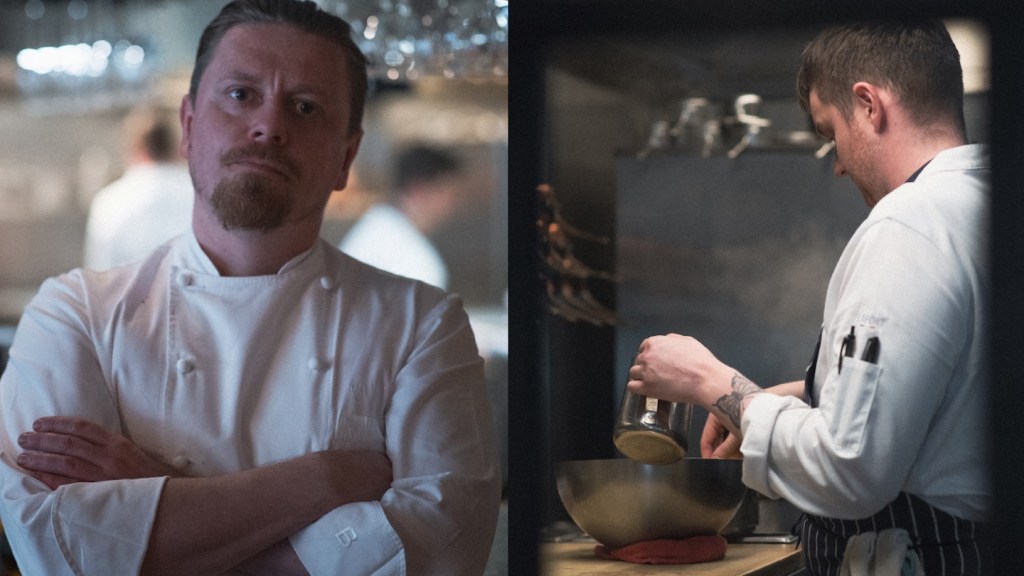In Nicaragua, tacos are made out of maize, rolled up in a tube, and deep-fried in a feverish vat of oil. In the city of León, and on the western side of the country in particular, they’re graffiti’d with shredded cabbage and drenched in too much cream. The meat inside is pork or chicken,—slow-cooked, seasoned and so very sweet. A dollop of salsa on top is always appropriate and in this country, that means a rather simple medley of chopped onions with salt, vinegar, and chilies.
Nicaraguan tacos landed on my radar by accident. A group of friends and I were driving back from the beach when we spotted a long line in front of a restaurant called Taco Marlene.
Videos by VICE

Outside Taco Marlene. Photos by the author.
I rarely see long lines in León, except for at the bank. And so began the following thought process: Surely this is tastier than a bank; a long line means it has to be good.
I was right—on both counts.

Marlene is no hidden gem; all the locals know about her. She’s a thin restaurant on a main street, located in close proximity to a handful of competitors who serve the exact same thing. Yet every single day, from 5 PM to 11 PM, she attracts longer lines than the competition.
Unless it rains.
Rain in León is the dramatic kind—the type that gets you soaking wet within seconds of contact. It’s unforgiving and uncomfortable, so when it comes (and it often does this time of year) no one goes outside, much less line up. I did, however, once get trapped inside Taco Marlene during a thunderstorm and witnessed a beautiful couple run in, soaking wet, just for the tacos. The woman, in full makeup, used one hand to gracefully squeeze the water out of her hair and the other to eat the taco.

Yes, they are that good. And forgive the cliché, but it’s the insides that count.
The texture of the meat is akin to that of pulled pork. It’s stringy and soft, smothered in its own juices. But instead of being salty and briny, the flavor profile is more sugar and spice. Tacos in León are rather greasy, and the cream and cabbage on top ensure an extra layer of messiness. These are the regional distinctions.
At Marlene’s, the menu has just three items: pork, chicken or cheese. Each piece, rather large, is a very reasonable 25 cordobas (nearly US $1).
It’s a family-owned business and Marlene is owned by her namesake—Marlene Torres Arcia. Arcia started the business nearly two decades ago but these days it is her daughter, Junick Verania Hernandez Torres, who’s in charge of the operations.

Torres is hesitant to be interviewed. She dawdles at the back of the restaurant, giving me the side-eye. At the insistence of her family, she eventually gives in but answers my questions in a short, staccato manner. She tells me they’ve been in the taco business for 21 years and that the recipe itself is nothing special.
“It’s how we cook it that makes the difference,” she says.
We make our way to the kitchen. The set-up is almost too simple. There’s a frying and cutting station, and the rest of the space is used mostly for storage.
Each day, the kitchen goes through ten pounds of chicken, ten pounds of pork, and 20 pounds of cheese. Pork and chicken are slow-cooked for four hours in a pot, joined by a medley of onions, garlic, carrots, potatoes, tomatoes, mustard, Worcestershire sauce, salt, pepper, and sugar. The cheese is a simple queso fresco—a fresh cheese with the texture of mozzarella seasoned with a bit of salt. The meats are made in-house; the cheese is delivered.

The preparation process starts at 1 PM every day. By 5 PM, when the doors are opened, a scoop of filling is rolled up in each corn tortilla and quickly deep-fried.
The restaurant is pint-sized. It has just nine wooden tables accessorized with plastic chairs but for customers, space is never much of a deterrent. Lines regularly snake out of the door and people are more than content with take-out.
“Everyone in León has heard of Marlene,” says Fatima Quant, a longtime customer. “They’ve been the most famous taco place for at least a decade.”
According to Torres, they pass out 300 tacos a day—but during high season, especially once December rolls around, that number shoots up to a cool 1,000.

After my interview with Torres, I order a couple of tacos. But as I go up to the counter to pay, I see Torres in the corner, shaking her head.
I’m confused, slightly bewildered. Did I offend her?
She tells me that today dinner is on her.
“We make out tacos here with love,” she says. “Tell everyone that if you come to León and don’t try the tacos here, you’ve missed out.”
For the first time, she smiles.



